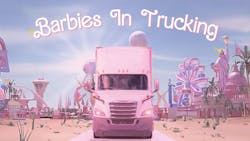Some have called 2023 a year for women with Taylor Swift and Beyonce’s successful tours and the release of the blockbuster “Barbie” movie. Now, some trucking industry representatives want to capitalize on this by petitioning toy manufacturing company Mattel to create a truck driver Barbie.
Since Mattel launched Barbie dolls in 1959, Barbie has held numerous jobs in predominantly male-dominated fields, such as doctor, U.S. Air Force pilot, and astronaut. She’s also had blue-collar careers, including construction worker, police officer, and firefighter. Barbie has even had jobs in the transportation industry, such as train conductor and aircraft engineer. But Barbie has never been a truck driver.
According to the 2023 Women in Trucking Index, women make up 12.1% of professional truck drivers. While this number has significantly increased in the past several years, more fleets want to tap into this potential driver pool by establishing more gender diversity in the industry. This is why Transforce, a driver recruitment company, started the “Barbies in Trucking” campaign.
“Since COVID, there’s been a massive push to bring more women into the field of trucking. But 12.1% highlights a pretty significant gap of representation,” Danielle Bansch, national account manager at Transforce, told FleetOwner.
See also: WIT: Women in driver, technician roles still low, but their numbers gain elsewhere
Bansch said Transforce leaders brainstormed many ways to highlight this gender diversity gap, but the company was inspired by the “Barbie” movie and other significant moments this year for women.
“There were magazines being issued at the time saying that women are carrying the American economy on their backs,” Bansch said. “And we thought, yes, they are, and so are truck drivers.”
While there are multiple angles to take when combating this gender diversity gap, Transforce decided to start with the next generation of potential truck drivers, especially young girls.
“Representation is important,” said Kelly McGurk, VP of revenue marketing at Transforce. “It’s a good message to girls that they have a place at the table and in the industry, whether that’s as a driver or in any other type of role. But just creating that space at a young age says that you can be a part of this; you can actually think about this in your lifetime as part of your career.”
A petition isn’t the official way to pitch new products to Mattel, according to its website, nor is there any evidence that previous similar petitions succeeded. However, Transforce still hopes to gather as many signatures as possible before officially delivering to Mattel.
“We want to capture their [Mattel’s] attention through unofficial means before we go to them in an official manner, which is also the reason for the petition: to show the unwavering support from the industry for this role and then highlight the business opportunity for them,” said Bansch.
When signing the petition, people can leave comments to show support. One commenter, Nzia Pratt, said, “I am a life-long Barbie lover and now a truck driver. Until I joined the industry, I knew two women who were drivers. I always liked trucks but didn’t really see it as a viable option. Maybe Barbie would have helped me envision it sooner.”
The truck driver Barbie petition went live on Oct. 4 and has 1,016 signatures as the morning of of Dec. 15. If Mattel recognizes the potential of this campaign, then maybe next Christmas, drivers, fleet managers, and others in the industry could gift their children a truck driver Barbie doll.
About the Author

Jenna Hume
Digital Editor
Digital Content Specialist Jenna Hume joined FleetOwner in November 2023 and previously worked as a writer in the gaming industry. She has a Bachelor of Fine Arts degree in creative writing from Truman State University and a master of Fine Arts degree in writing from Lindenwood University. She is currently based in Missouri.

